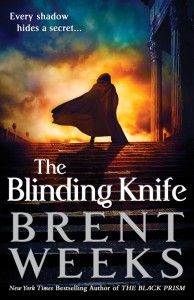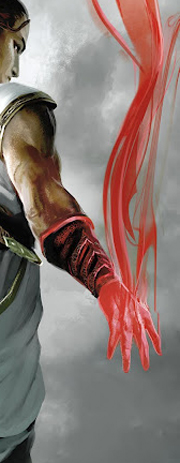
My first exposure to Brent Weeks wasn’t through his fiction, though his first series, the Night Angel Trilogy, was popular among other bloggers and readers like myself. Instead, I was first exposed to Weeks through Twitter (@BrentWeeks). At some point long forgotten, Weeks and I began following each other. Me, a blogger with the potential to promote his books; him, an up-and-coming Fantasy writer who had the gall to not only finish a chunky Fantasy series in three books, but publish the whole trilogy over the course of only two months. I found Weeks to be funny and generous, and a passionate fan of Fantasy, with many similar authors littering the root of his passion and mine. Most pointedly, perhaps, was Terry Brooks, one of the forefathers of modern Fantasy.
So when his next trilogy was announced, a trilogy entirely unrelated to his previous work, I decided that I’d jump in there, not just out of curiosity, but because I now considered Weeks a friend, if one connected only by the thin threads of Twitter and Facebook. My reaction to the novel was somewhat mixed. For all its successes — a likeable set of protagonists, an interesting take on typical Epic Fantasy worldbuilding, a fresh magic system — it was littered with problems — clunky exposition, an overreliance on the reader being invested in a complicated magic system — and I finished the novel feeling somewhat perplexed about my opinions. I couldn’t even be sure whether I enjoyed it or not, or whether I was interested in reading further in the series. Instead of reviewing the novel, I put it aside and just sort of let it be.
As time passed, however, I was surprised to find myself developing a further fondness for The Black Prism. Despite my initial reservations and the fatal flaws in the execution of both the magic system and the structure of Weeks’ prose, I began to forget the negative aspects of the novel, and realized that the core of the novel, the characters, the integration of the magic system into the world building, the politicking that powered a lot of the plot, were enjoyable and interesting, and, damnit, I was looking forward to reading The Blinding Knife. I wasn’t prepared, however, for the significant leap that The Blinding Knife would take over The Black Prism in every single facet that’s important to Epic Fantasy and general storytelling.
Much of this improvement is due to the fact that Weeks now seems significantly more comfortable in his world and with his magic system, freeing him to get back to the basic fundamentals of storytelling: plot, characters and consequence. Being freed from having to endlessly explain the magic system allows Weeks’ to dig into these aspects, trusting the reader to understand the magic, and the entire narrative feels more refined and more focussed than in The Black Prism.
That we’re not perfect says nothing about our enemies, Kip. Nothing.
Short, snappy chapters ensures that each character is given just enough screentime to accomplish what they need to before the reader is whisked off to another of the characters. Some of these plot lines intersect, with one point-of-view picking up where the previous left off, others transition awkwardly, leading to some ‘interesting’ timelines as only minutes pass between a characters’ two chapters, but the sequences in between consume several hours worth of time. Each of Weeks’ several main characters are interesting and invested enough that I never minded being swept away from one to the other. The only hiccup comes from the one-off, stream-of-consciousness style chapters involving random characters, both current and historical, that jarringly interrupt the otherwise strong pacing of the novel. These chapters are later explained, but don’t seem to add much of value to the overall narrative, suggesting that they’re an experiment that might have been better left on the cutting room floor.
Weeks’ characters are a strong point of the novel, but of particular note is the strength of his female characters. They live in a world where magic puts women on equal footing as men in terms of soldiering and combat, allowing them to match arms with the men. But, though many of the women in the story are physically powerful, the real strength comes from the challenges the face and the methods, physical, emotional and mental, that they use to overcome them. Or, in some cases, succumb to these challenges. Weeks makes no excuses for these women.
I was particularly taken one character who, against her nature, and despite having very valuable skills otherwise, attempts to seduce Gavin because she doesn’t know how else to deal with and manipulate the world’s most powerful man. It’s a thin blade to walk along, but Weeks handles it delicately and with a surprising amount of heart, and the repercussions ripple through the rest of their story and lead to one of the novels’ most interesting relationships.

At centre stage, and at the heart of the novel, are Karris, Teia and Liv, three women who are tied to each of the three main men in the novel, Gavin Guile, Kip Guile and the Color Prince, but who each play an integral role in the novels’ themes and ongoing plot, with their own set of responsibilities and choices to make. All three struggle in their own ways to define themselves, to carve out a place for themselves amongst the growing chaos. Each is challeneged, and they all come to crossroads that will help shape the series going forward. It’s clear that Weeks has big plans for all three in the concluding volumes of the series.
There’s a passage late in the novel about Liv that, I think, tells the reader as much about Kip and the other characters as it does about her. She finds herself at a pivotal moment, with great repercussions for herself and the Seven Satrapies, balanced on her decision, and thinks, through the narrator:
This was her last test. This was what she was made for. If she did this, the Color Prince would give her more than she’d ever dreamed. She’d never again be inconsequential. She could never again be ignored, despised, powerless.
Throughout much of The Black Prism, Kip pines over Liv, lusting after her as much because of raw, adolescent hormones and sexual desire as because of the admiration he has for the capable older girl. Through passages like the one above, Weeks highlights the differences in perspective that become obvious when a person views themselves versus how they are perceived by others. I think that Liv is a good example of a character who is exactly the person she believes she is — weak and maligned, ripped-off — who Kip believes she is — authoritative and kind, responsible and alluring — and something else entirely — easily manipulated, hurt, confused.
In many ways, the titular Blinding Knife only plays into the plot of the novel in tangential ways, mostly as a device to save an under-powered Kip from obviously stronger opponents, and acting as the catalyst for a major plot twist in the final pages of the novel, beginning a chain of events that is sure to be at the core of the Kip’s challenges through the remaining two volumes of the series. Though, knowing Weeks, everything will likely change again in the third volume, with plot twists and established ideas flipped on their heads and presented to the reader from yet another angle.
 Similar to the Blinding Knife, Kip’s role in the active events of the novel have been pulled back somewhat, with the bulk of his story taking place within The Chromeria, the tower where the world’s most powerful men and women gather, ruling the world and carefully monitoring its magic. Kip spends his time there training to join the Blackguard, an elite fighting force that lets only a few exceptional students into its ranks. Anyone who has read The Black Prism will know that Kip, known affectionately to the other students in The Chromeria as Lard Guile, in an unlikely candidate to join those elite ranks. The real key to this sequence, in addition to ensuring the Kip has the power, knowledge and friends to survive the rest of the series, is to open the doors for the novels’ recurring theme of self-identity.
Similar to the Blinding Knife, Kip’s role in the active events of the novel have been pulled back somewhat, with the bulk of his story taking place within The Chromeria, the tower where the world’s most powerful men and women gather, ruling the world and carefully monitoring its magic. Kip spends his time there training to join the Blackguard, an elite fighting force that lets only a few exceptional students into its ranks. Anyone who has read The Black Prism will know that Kip, known affectionately to the other students in The Chromeria as Lard Guile, in an unlikely candidate to join those elite ranks. The real key to this sequence, in addition to ensuring the Kip has the power, knowledge and friends to survive the rest of the series, is to open the doors for the novels’ recurring theme of self-identity.
Each of the main characters struggles with their own self-identity, weighing themselves against the expectations thrust on them by their responsibilities. Through Kip, Weeks explores what it takes to step back and evaluate oneself honestly and openly, accepting flaws and also humbly acknowledging inner strengths.
Many of Kip’s self-reflective moments come as the result of playing a fictional card game called Nine Kings against his grandfather, a rotten bastard named Andross Guile. The game is an interesting addition to the novel, and, as a former junkie for Magic: The Gathering, I enjoyed playing the game alongside Kip and his opponent, as much as I could with the rules presented to me, and it is clear that Weeks put a lot of effort into developing a system that works. The interplay and dialogue between him and Andross, between turns and bookending either end of the games, is among the highlights of the novel.
The Mediterranean-inspired setting continues to shine and is further explored, opening up the politics of the seven satrapies and introducing readers to the uneasy relationships and prejudices that bubble beneath the surface of the population under Gavin’s wing, and threatened by the Colour Prince’s army and ideals. Weeks’ land is populated by both anglo and non-anglo characters, and the author explores the ideas of race and religion in a manner that doesn’t directly interfere with the plot, but adds to some of the series’ more important thematic elements, such as authority, control and belief.
The Blinding Knife improves on The Black Prism in every conceivable way.
The Black Prism finds a nice middle-ground between the often PG writing of Brandon Sanderson and the rampant brutality and nihilism of Joe Abercrombie. It’s fast, it doesn’t hold back its punches, but there’s also a sense of hope, and the humour is bright. The Blinding Knife improves on The Black Prism in every conceivable way, and places Brent Weeks on comfortable footing beside contemporaries like Brandon Sanderson and Joe Abercrombie, if not a step above. I thought it would be a fun distraction, but instead found one of the best Fantasy books of 2012.

I love how you describe Brent’s writing as the middle-ground between Sanderson and Abercrombie. That analogy is certainly going to stick in my mind. Nicely done.
Thanks, Aidan.
Again, I need to read The Black Prism…
I have yet to see a great fantasy review site such as yours and then seeing a review of one of my favorite authors (right now) was wonderful. I agree with Daniel as well, because I have thought often of Brent as a bit more hardcore version of Sanderson (whom I also love). Anyways, thanks for the the great site and review!